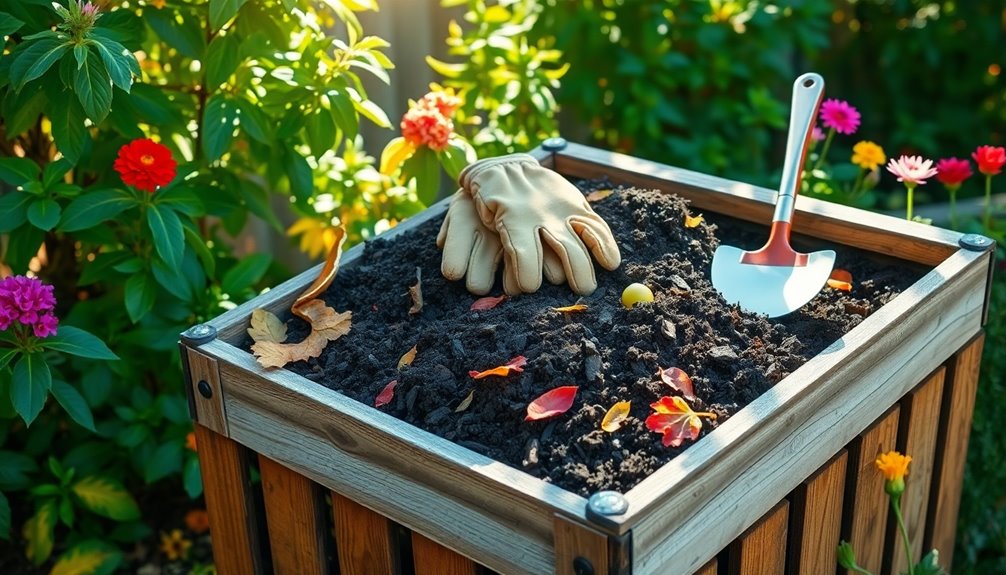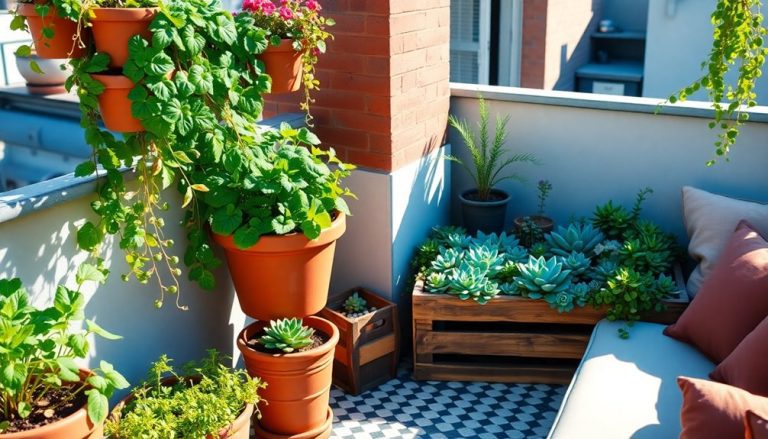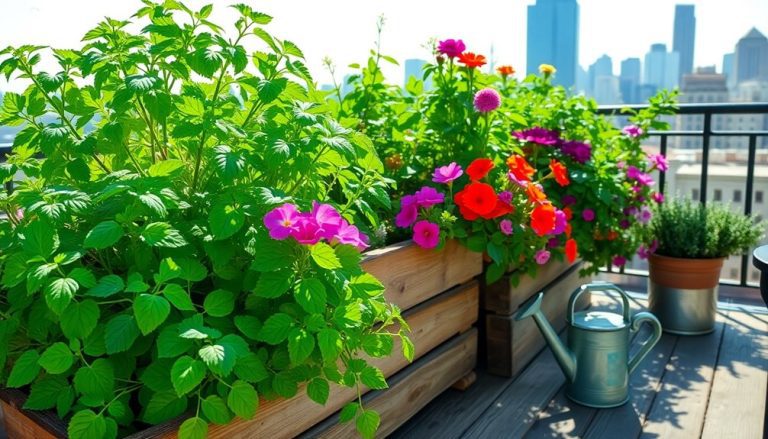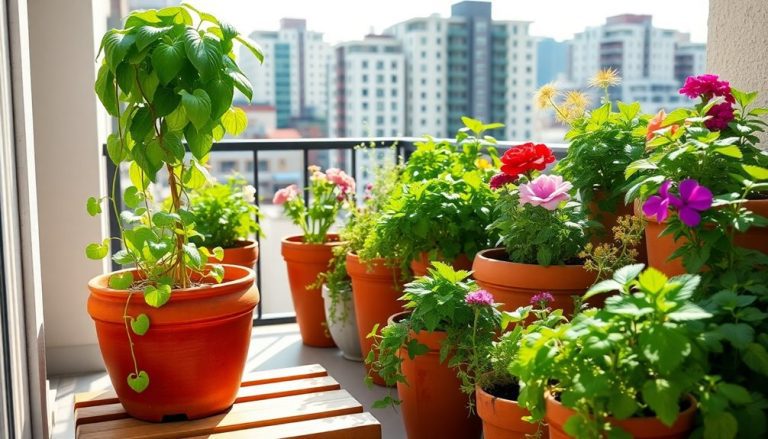To achieve composting success as a beginner, start by choosing a compost bin that fits your space. Mix greens like vegetable scraps and browns such as dried leaves in a 3:1 ratio. Make sure to aerate your pile every few weeks to prevent odors and speed up decomposition. Monitor moisture, keeping it similar to a damp sponge, and avoid adding meat, dairy, and oils to prevent pests. Be patient, as composting takes time. With practice and the right materials, you'll soon enjoy nutrient-rich compost for your garden. There's so much more to explore on this topic to enhance your composting journey!
Key Takeaways
- Start with a balanced mix of 3 parts browns to 1 part greens for effective decomposition.
- Regularly turn the compost pile every few weeks to aerate and promote faster breakdown.
- Monitor moisture levels, aiming for a damp sponge feel to maintain optimal conditions.
- Avoid composting meat, dairy, and oils to prevent pests and odors in your pile.
- Be patient; composting takes time, but the end result will enrich your soil.
Understanding Composting Basics
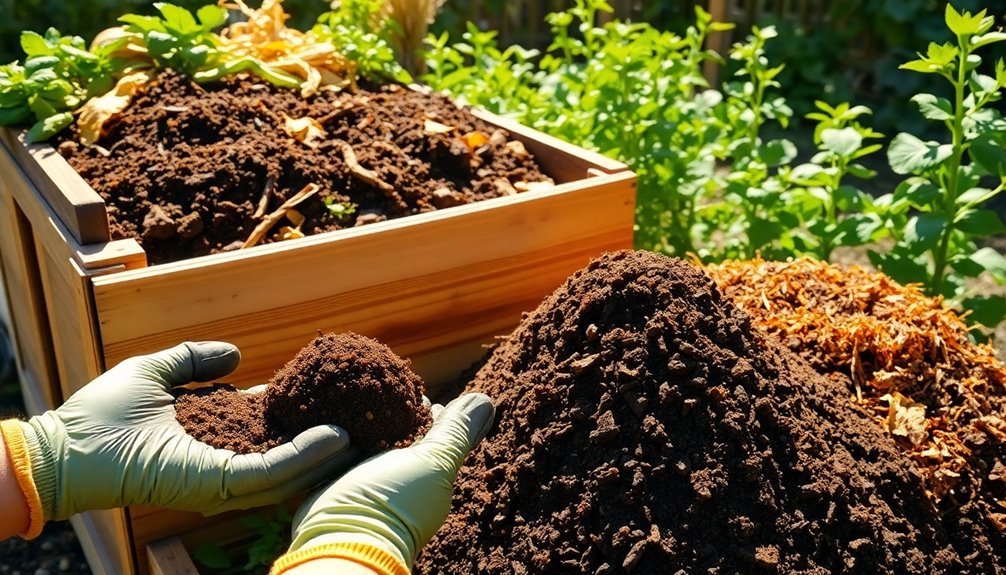
Composting is a rewarding process that transforms organic waste into nutrient-rich soil. To get started, you need to understand the basic components of composting: greens, browns, air, and moisture.
Greens include nitrogen-rich materials like vegetable scraps and grass clippings, while browns consist of carbon-rich items like dried leaves and cardboard. Balancing these two types is crucial for a successful compost pile. Using a quality compost tumbler can significantly enhance the speed of decomposition.
You'll want to maintain a ratio of about three parts browns to one part greens. This balance encourages decomposition and prevents unpleasant odors.
Next, ensure your compost pile has adequate airflow. Turning your pile regularly introduces oxygen, which speeds up the breakdown of materials.
Moisture is another key factor. Your compost should feel like a damp sponge—wet but not soggy. If it gets too dry, add some water or more greens; if it's too wet, mix in extra browns to absorb excess moisture. Additionally, investing in the right compost bin products can help optimize your composting process.
Choosing the Right Compost Bin
Selecting the right compost bin can make a significant difference in your composting experience.
First, consider your space. If you're limited on yard space, a compact bin or a worm composter could be ideal. For larger gardens, a traditional bin or tumbler might suit your needs better, allowing for more volume and easier management. Additionally, using high-quality soil products can help enhance the nutrients in your compost.
Next, think about the materials. Plastic bins are lightweight and often come with a lid to keep pests away. Wooden bins provide excellent ventilation but may require more maintenance.
Also, consider the design. Some bins have features like removable bottoms for easy access to finished compost or built-in aeration systems to speed up the process.
Lastly, check your budget. Compost bins come in various price ranges, so it's important to find one that fits your financial plan. Additionally, exploring innovative outdoor composting solutions can enhance your composting experience.
Ultimately, the right bin should make composting enjoyable and efficient. By choosing wisely, you'll create an environment that supports healthy decomposition and helps you produce rich compost for your garden.
Happy composting!
What to Compost
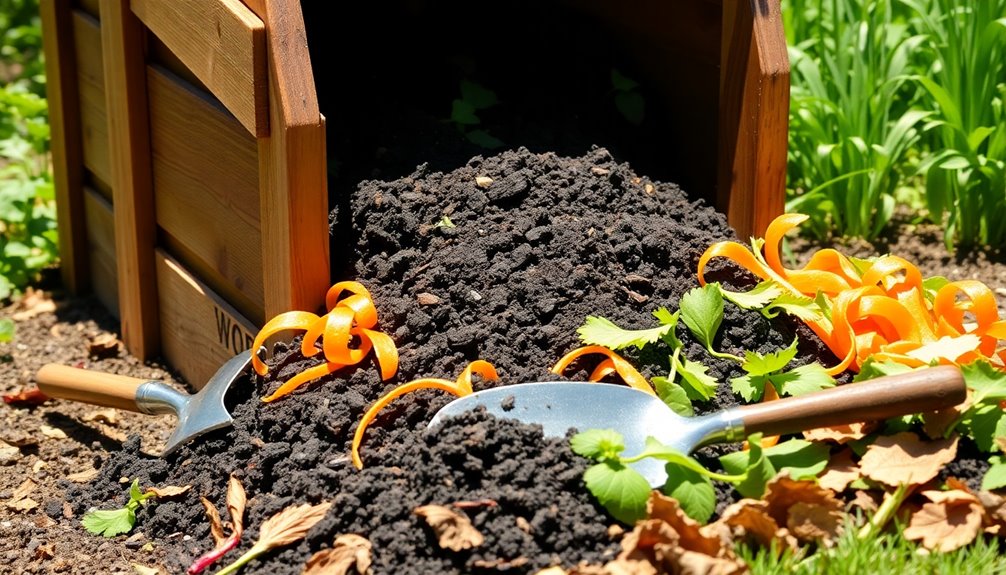
- Fruit and Vegetable Scraps: Leftover peels, cores, and overripe produce are perfect for composting.
- Coffee Grounds and Filters: They add nitrogen to your compost and help improve soil structure.
- Eggshells: Crushed eggshells provide calcium and help balance pH levels in your compost.
- Yard Waste: Grass clippings, dried leaves, and small branches enrich your pile with carbon.
These items break down easily and contribute essential nutrients to your compost. Additionally, using organic mulching materials can enhance moisture retention in your compost pile.
Remember to balance "green" materials (like fruit scraps and coffee grounds) with "brown" materials (like dried leaves) for optimal results.
Always keep your compost pile aerated by turning it regularly, which will help speed up decomposition and prevent any unpleasant odors.
By knowing what to compost, you'll set the stage for a thriving compost pile that enriches your garden and reduces waste.
Happy composting!
What Not to Compost
While it's tempting to toss everything into your compost bin, avoiding certain materials is key to maintaining a healthy compost pile.
First off, steer clear of meat, dairy, and oils. These items can attract pests and create foul odors, making your composting experience less enjoyable. Additionally, avoid including cooked foods, as they can also lead to unwanted critters and smell issues.
Next, don't compost pet waste. It can contain harmful pathogens that aren't safe for your garden. Similarly, avoid incorporating diseased plants or weeds that have gone to seed; these can spread diseases and unwanted growth in your garden.
Chemically treated wood, charcoal ashes, and synthetic materials like plastic or metal are also big no-nos. They can introduce toxins and hinder the natural decomposition process, undermining your compost's effectiveness.
Lastly, steer clear of large branches and tough plant materials. These can take forever to break down and disrupt airflow in your compost pile.
Maintaining Your Compost
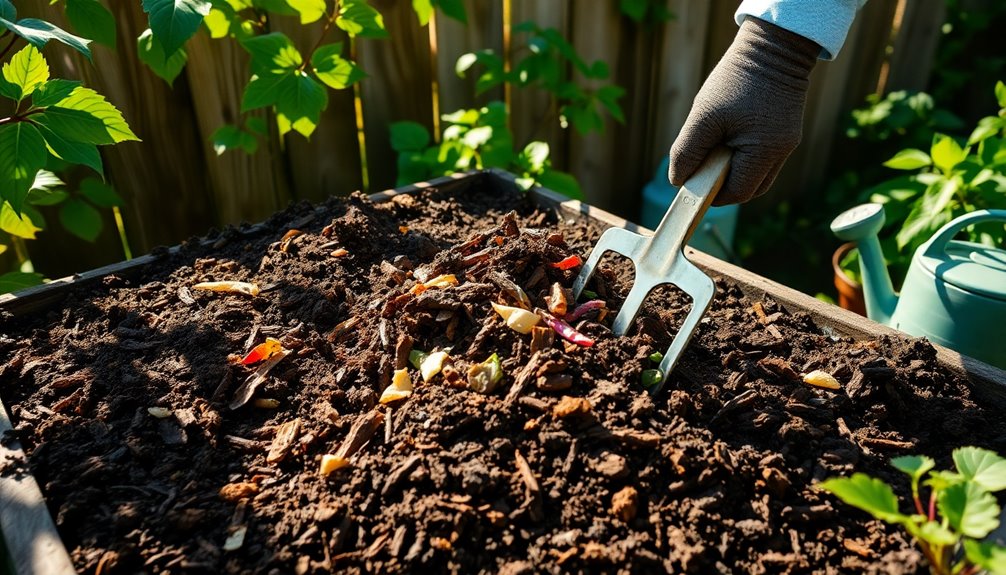
To keep your compost thriving, you need to regularly monitor and manage its conditions. This ensures that your compost breaks down efficiently and transforms into nutrient-rich soil.
Here are some essential steps to maintain your compost:
- Aerate: Turn your compost every few weeks to introduce oxygen. This helps speed up decomposition and prevents unpleasant odors.
- Moisture Check: Your compost should feel like a damp sponge. If it's too dry, add water, and if it's too wet, add dry materials like straw or dry leaves to balance it out.
- Layering: Alternate between green materials (like kitchen scraps) and brown materials (like dried leaves). This balance promotes healthy decomposition and prevents clumping.
- Temperature Monitoring: Keep an eye on the temperature. A well-maintained compost pile should heat up to 130-160°F. If it cools down significantly, turn it to revitalize the process.
Troubleshooting Common Issues
Even with careful monitoring and maintenance, you might encounter some common issues in your compost pile. One frequent problem is a foul odor, often caused by too much moisture or not enough aeration. If your compost smells bad, turn it more frequently to increase airflow and consider adding dry materials like leaves or straw to absorb excess moisture.
Another issue is slow decomposition. If your compost isn't breaking down, check the balance of green and brown materials. A good rule of thumb is to maintain a ratio of about 2:1 greens to browns. Additionally, chopping up larger items can speed up the process.
You may also notice pests, like fruit flies or rodents. To manage this, cover food scraps with browns or bury them deeper within the pile. This minimizes exposure and discourages unwanted visitors.
If your pile seems dry, simply add water or more green materials to boost moisture. On the flip side, if it's too wet, turn the pile and add dry materials to help absorb excess moisture.
Using Finished Compost
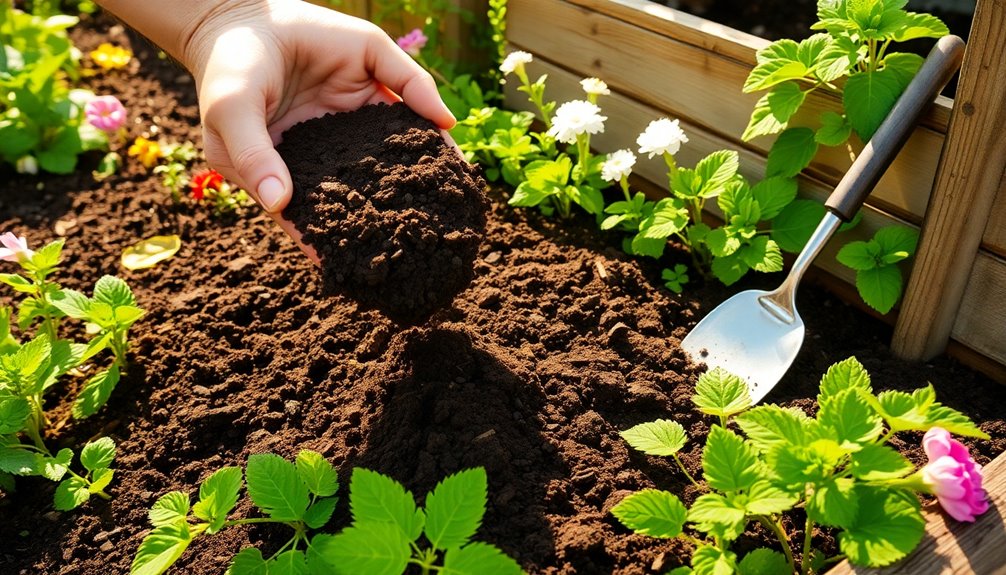
Once your compost is ready, you'll want to put it to good use in your garden. Finished compost is a fantastic resource that enriches your soil, helping plants thrive. Here are some effective ways to use it:
- Soil Amendment: Mix compost into garden beds to improve soil structure, drainage, and nutrient content. This gives your plants a strong foundation.
- Mulch: Spread a layer of compost around your plants as mulch. It helps retain moisture, suppress weeds, and adds nutrients as it breaks down further.
- Potting Mix: Combine finished compost with other materials to create a nutrient-rich potting mix for indoor plants or container gardening. This ensures your plants get the best care.
- Lawn Top Dressing: Lightly spread compost over your lawn to boost grass health. This can improve soil quality and promote a lush, green lawn.
Using finished compost not only benefits your garden but also reduces waste.
You'll enjoy healthier plants and a more vibrant garden ecosystem, all while recycling your kitchen scraps and yard waste. It's a win-win!
Tips for Composting Success
Successful composting can feel daunting, but with a few key tips, anyone can create nutrient-rich compost at home.
First, start with a balanced mix of green and brown materials. Greens, like vegetable scraps and grass clippings, provide nitrogen, while browns, such as dried leaves and cardboard, offer carbon. Aim for a ratio of about 2:1, brown to green, to keep the compost pile healthy.
Next, chop or shred larger pieces to speed up decomposition. Turning your compost regularly—every few weeks—will aerate it, helping the microbes work more efficiently.
Keep the pile moist, but not soggy; a damp sponge is a good analogy.
Monitor the temperature of your compost. It should ideally reach between 130°F and 160°F to kill harmful pathogens and weed seeds. If it's too cool, add more greens and turn the pile to introduce oxygen.
Lastly, be patient! Composting takes time, typically a few months, depending on your methods and materials.
Frequently Asked Questions
Can I Compost Meat and Dairy Products?
You shouldn't compost meat and dairy products. They can attract pests and create odors. Stick to fruits, vegetables, and yard waste for a healthier compost pile that's easier to manage and benefits your garden.
How Long Does Composting Take?
Composting typically takes anywhere from a few weeks to several months, depending on factors like materials used, moisture, and temperature. You can speed it up by turning the pile regularly and maintaining proper balance.
What Should I Do if My Compost Smells?
If your compost smells, don't worry; it's a common issue. Turn your pile to aerate it, add dry materials like leaves to balance moisture, and avoid overloading with green waste. Freshen it up and enjoy!
Is Composting Safe for Pets?
Composting can be safe for pets if you maintain a balanced pile and avoid harmful materials. Keep your pets away from the compost bin to prevent them from ingesting anything dangerous or unpleasant. Always supervise them.
Can I Compost in Winter?
Did you know that up to 30% of household waste can be composted? Yes, you can compost in winter! Just maintain your pile's heat with proper materials and turning it regularly to keep the process active.
Conclusion
Composting can transform your kitchen scraps into black gold for your garden! By following these easy steps, you'll not only reduce waste but also boost your plants' growth like a superhero. Remember to keep your compost balanced, maintain it regularly, and avoid common pitfalls. Soon enough, you'll be reaping the benefits of rich, nutrient-dense compost. So, roll up your sleeves and dive into the world of composting—you've got this! Happy composting!

